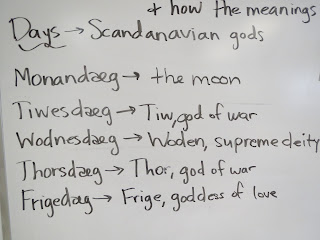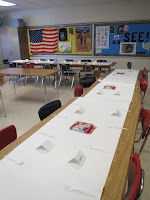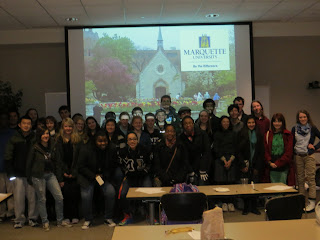My son came in five months after his first appearance in Linguistics class so that we could discuss his growth during his "language explosion" period. Ben was told that he would be coming in to teach the students about baseball.
Wednesday, May 22, 2013
Sunday, May 12, 2013
Our Linguistics class was in the newspaper!
"MPS teacher's linguistics class an example of valuable, enterprising course" by Alan J. Borsuk
http://www.jsonline.com/news/education/mps-teachers-linguistics-class-an-example-of-valuable-enterprising-course-nc9qlkg-206114351.html
Friday, May 10, 2013
Research Project Presentation Rubric
Linguistics
Research Presentation Rubric
(5 minute presentation, 25 points)
5 pts. for Delivery (eye contact, organization, professional appearance, support for partner)
15 pts. for Content (background info, hypothesis, experiment, results, analysis)
5 pts. for Visual (hand-out, poster, powerpoint/prezi, graph, chart)
Friday, May 3, 2013
Research Project Requirements
Linguistics Research Project
Spring 2013
- You may work with one partner.
- Remember that linguists are scientists. You will use the scientific method for
your project.
The
steps of the scientific method are to:
1. Ask a Question
2. Do Background Research
3. Construct a Hypothesis
4. Test Your Hypothesis by Doing an
Experiment
5. Analyze Your Data and Draw a
Conclusion
6. Communicate Your Results
Here’s
how we’ll do that:
1. Ask a Question Picking your topic is a very
important part of the process. Start by
asking a question that you have related to language. Think about what you’ve written about in your
Daily Language Observations as a starting point. Select a question/ topic that is narrow
enough so that you can say something significant about what you learn. For example, “Sociolinguistics” is not an
appropriate topic; it is a vast field about which hundreds of books have been
written. “How Often Spontaneous
Conversations Happen in Elevators at West Allis Memorial Hospital on May 8, 2013”
is a more manageable topic.
2.
Do Background Research Look
up your topic online and in books. Have
other linguists written about your topic?
Take notes on what you find, keeping careful track of your sources.
3.
Construct
a Hypothesis What
do YOU expect to find as the answer to your initial question?
4.
Test Your Hypothesis by Doing an
Experiment How will you
test your hypothesis? Through
observation? Through a survey? By eliciting data similar to how William
Labov did as he studied the relationship between social class and r-lessness in
the three stores in New York City
5.
Analyze Your Data and Draw a
Conclusion What have you learned? What does your data show?
6.
Communicate Your Results
What does your study teach us as linguists and as
people? What are the more far-reaching
implications of your study?
How
to Present Your Research:
·
Write a 4-6 page
essay in MLA format with in-text citations and a Works Cited page. It would be appropriate to use headings to
break up your essay to show the different parts of your study.
·
Plan a five
minute presentation to the class with the assistance of a visual aide (ex: poster, graph, hand-out, Power Point, Prezi).
Sunday, April 28, 2013
Thursday, April 25, 2013
Etymology Assignment
Every word has a history. Etymology is the study of the origin of words and how the means of words have changed over time.
2. Tundra
3. Bog
4. Canyon
5. Villain
6. Sauna
7. Buffalo
8. Worm
9. Sinister
10. Yacht
Next research the etymology of five words you enjoy and are curious to learn more about.

Using a
dictionary and the internet, research the ETYMOLOGY of the following words:
1. Banana2. Tundra
3. Bog
4. Canyon
5. Villain
6. Sauna
7. Buffalo
8. Worm
9. Sinister
10. Yacht
Next research the etymology of five words you enjoy and are curious to learn more about.

Sunday, April 21, 2013
TED-Ed
I went to a conference on creativity and technology at the Milwaukee Art Museum yesterday where Logan Smalley, the director of TED-Ed, spoke. TED-Ed provides hundreds of lessons created by teachers, animated by professionals. Several great lessons related to Linguistics are available on the site. My students are currently studying the History of English in our Linguistics class so below you will find some links to great videos relating to the history of English and word etymology. Teachers have the ability to "flip" a lesson, which means to tailor the lesson for their own students.
"How did English evolve?"
http://ed.ted.com/lessons/how-did-english-evolve-kate-gardoqui
"Why is there a 'b' in 'doubt'?"
http://ed.ted.com/lessons/beyond-the-shadow-of-a-doubt-gina-cooke
"Making sense of spelling?"
http://ed.ted.com/lessons/making-sense-of-spelling-gina-cooke

"How did English evolve?"
http://ed.ted.com/lessons/how-did-english-evolve-kate-gardoqui
"Why is there a 'b' in 'doubt'?"
http://ed.ted.com/lessons/beyond-the-shadow-of-a-doubt-gina-cooke
"Making sense of spelling?"
http://ed.ted.com/lessons/making-sense-of-spelling-gina-cooke
Saturday, April 6, 2013
Language Magazine Online
http://languagemagazine.com/online/
I just found this great magazine; their content is free on their website--tons of accessible articles for high school students!
Saturday, March 9, 2013
Monday, February 25, 2013
Scones in Wisconsin: British English vs. American English
As an Anglophile and a teacher of Linguistics, I had to spend talking with my students about the differences between American and British English. The Project Britain website provides wonderful resources on lexical differences between British and American language and culture. I used their fill-in-the-blanks worksheet as a small group activity while we all enjoyed some tea and biscuits. Then each group got a hand-out related to either food, people, places, clothing, or school and hand to come up with a sentence using as many British English words as possible.
An example sentence students wrote and then "translated" for us is: "My mate met a lollypop man and the lad turned out to be a nutter and wouldn't let my chum cross the lane even after a bobby came by."
http://www.projectbritain.com/activities.html
Saturday, February 16, 2013
Pidgin Dinner 2013
It's a funny thing to walk into an English classroom where English is not allowed, but that's what my students did yesterday. MSL Linguistics students shared a feast seated next to fellow classmates who speak different native or second languages than they do. Students spoke Spanish, French, German, Mandarin, Wolof, Hmong, and Serbian and managed to be able to get the chicken, egg rolls, tacos, noodles and desserts passed around the room. We all recognized the importance of facial expressions and gestures in our communication.
Enjoy some photos from the event!
Enjoy some photos from the event!
Sunday, February 3, 2013
TED Talk on Language Acquisition
This TED talk is a great 10 minutes spent learning about language acquisition. It's very accessible for high school students:
http://www.ted.com/talks/patricia_kuhl_the_linguistic_genius_of_babies.html
Saturday, February 2, 2013
NACLO 1/31/13
We participated in NACLO this year at Marquette University. Thanks so much to organizational mastermind Dr. Joyce Tang Boyland whose efforts led to the Marquette/UWM sites having more students participating in NACLO than anywhere else in North America!
We also enjoyed meeting up with MSL (and Linguistics class) alumni and current Marquette freshmen Kylie Dolphin and Daniel Bernard.
In the afternoon, we had a chance to visit the Raynor Library to see their collection of J.R.R. Tolkien's manuscripts, including his original drafts of The Hobbit.
We also enjoyed meeting up with MSL (and Linguistics class) alumni and current Marquette freshmen Kylie Dolphin and Daniel Bernard.
In the afternoon, we had a chance to visit the Raynor Library to see their collection of J.R.R. Tolkien's manuscripts, including his original drafts of The Hobbit.
NACLO Practice
Our thanks to Dr. Steven Hartman Kaiser and his students from Marquette University for helping us to prepare for this year's North American Computational Linguistics Olympiad!
Saturday, January 26, 2013
NACLO is January 31st!
Students, click on the following link to get the latest information about the NACLO competition on Thursday!
http://hslinguistsmke.wordpress.com/

http://hslinguistsmke.wordpress.com/
Friday, January 25, 2013
Tolkien Archives
Students, here is a link to learn more about the J.R.R. Tolkien archives that we will see at Marquette University after the NACLO competition next week.
http://www.marquette.edu/library/archives/tolkien.shtml

http://www.marquette.edu/library/archives/tolkien.shtml

"Them and Uz" by Tony Harrison
I plan to use this video of British poet Tony Harrison reading his poem "Them and Uz" to start a conversation on the inextricable link between language and identity.
http://www.youtube.com/watch?v=H8pnEYBzY5g

http://www.youtube.com/watch?v=H8pnEYBzY5g
Human Language Series Videos
If you can get your hands on the Human Language Series videos, you should get them for your students to watch! Once you and your students get over the fun of enjoying early-1990s era fashion (glasses, in particular), you will be presented with a number of fantastic interviews with world-famous linguists. If your school has the budget available, you can buy the set of three for $545 at http://www.equinoxfilms.net/page1.html. I was able to find copies at a local university library through WorldCat and one of my former students was able to check the DVDs out for me.
Sunday, January 6, 2013
Typing in IPA
Students, here is a link to make it possible for you to type in the International Phonetic Alphabet: http://ipa.typeit.org/
Subscribe to:
Posts (Atom)



































